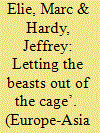|
|
|
Sort Order |
|
|
|
Items / Page
|
|
|
|
|
|
|
| Srl | Item |
| 1 |
ID:
177110


|
|
|
|
|
| Summary/Abstract |
This paper explores the trends, step changes and innovations that could impact the integration of renewable energy into electricity systems, explores interventions that may be required, and identifies key areas for policy makers to consider. A Delphi approach is used to collect, synthesise, and seek consensus across expert viewpoints. Over sixty experts across a range of geographies including the US, Europe, New-Zealand, Australia, Africa, India and China participated. They identified 26 trends, 20 step changes, and 26 innovations that could lead to major shifts in the design, operation, or management of electricity systems. Findings suggest that key challenges are not technological. Instead they are with delivering an aligned vision, supported by institutional structures, to incentivise, facilitate, and de-risk the delivery of a completely different type of energy system. There is a clear role for government and policy to provide a future energy vision and steer on strategic issues to deliver it; to create space for new actors and business models aligned with this vision; and to create an environment where research, development, demonstration and deployment can promote technologies, system integration and business model innovation at a rate commensurate with delivering net-zero electricity systems.
|
|
|
|
|
|
|
|
|
|
|
|
|
|
|
|
| 2 |
ID:
139270


|
|
|
|
|
| Summary/Abstract |
After a lapse of 15 years under Stalin, parole was reintroduced into the Soviet Gulag in 1954. For justice officials anxious to expunge Stalin's repressive legacy, the resurrection of parole signalled a return to correctionalism, societal oversight over the Gulag, and a vastly reduced rate of incarceration. In practice, though, parole exposed significant continuities with the Stalinist Gulag, including endemic corruption, overwhelming concern with production, suspicion of outside interference in penal affairs, and constant upward pressure on the inmate population. In the broader view, the experience of parole in the post-war USSR aligned closely with that of the Western world.
|
|
|
|
|
|
|
|
|
|
|
|
|
|
|
|
|
|
|
|
|